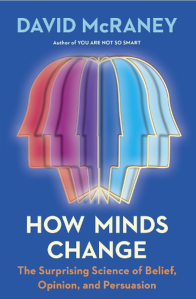600 words (7 minutes reading time) by Lancing Farrell
Have you ever had that eureka moment where something you were trying to understand is suddenly made crystal clear to you? That’s exactly what happened to me after reading David McRaney’s thought-provoking book, ‘How Minds Change – The New Science of Belief, Opinion, and Persuasion.’ This enlightening read gave me reason to revisit some past posts on improving local government performance. In reading the book (and this is deliberate by the author) I was led through Piaget’s stages of assimilation and accommodation, before eventually reaching a Kuhnian paradigm shift. My epiphany was realising why organisational change is so hard.
When I looked back at my earlier posts, I realised that my growth as a leader commenced when I first saw work as a system. At the same time, I genuinely believed that I needed to become the architect of better approaches. I had an academic background, experience of travelling overseas to broaden my outlook, and a relentless passion for my work. I thought that if anyone could revolutionise services, it would be me.
However, this view eventually transformed into a more holistic and community-oriented perspective as I started to see the work as a ‘frog’ system, not a ‘bike’ system. You’ll need to read my previous posts to grasp the analogy, but in essence, I transitioned from a thinking I needed to be a one-man show and lead others by giving them better ways, to a more participatory approach where everyone is engaged in finding improvements.
The turning point came when I realised that true progress couldn’t depend on my individual efforts. Sustainable change required collective involvement and learning. I couldn’t be the lone change agent. This realisation hit home hard and challenged everything I had been taught. At the same time, it reinforced what I was starting to learn.
Suddenly, I found myself in the position of guiding others on how to bring about change. This change had to begin from within the council organisation. Every staff member needed to be committed to improving services in alignment with community needs and expectations. My role shifted from the inventor of innovative solutions to a coach, providing support and techniques to help workers overcome barriers to change.
I later found that this approach reflected a community development philosophy based on leveraging people’s strengths and existing assets – we could help ourselves in the same way we are helping the community. It is an empowering, ongoing, and sustainable approach. It contrasted significantly with episodic ‘organisational transformations’ primarily driven by senior management, which often had a fleeting impact.
In essence, it was the age-old wisdom of teaching someone to fish instead of handing them a fish. McRaney’s book provided me with the insights to understand my transformation in what I believed and why my peers didn’t follow suit. I discovered why I was at odds with conventional leadership behaviors in local government.
It became evident that my peers hadn’t undergone the same change of mind. McRaney explains why this happens. They were clinging to familiar, command-and-control leadership methods, viewing them as safe and dependable. For many CEOs, this approach ensures job security, while for elected representatives, it’s often the expected norm. Unfortunately, these practices fall short in effectively addressing systemic challenges and ‘wicked’ problems—the complex issues that demand a new perspective – the opposite of OECD.
In conclusion, McRaney’s book reinforced the idea that change begins in our own mind. We must encourage leaders in local government to shift their perspectives from safe and familiar practices to bold, systemic thinking. Changing their beliefs will change their behaviour, which in turn will change the system they lead. Breaking away from conventional norms is the key to tackling the pressing challenges of our time and creating a brighter future for our communities.
It’s time for a collective paradigm shift in local government leadership.
I will write more about McRaneys book in a future post. If you are interested in hearing his ideas, he has a great podcast.
McRaney, David ‘How Minds Change – The New Science of Belief, Opinion and Persuasion’, 2022
